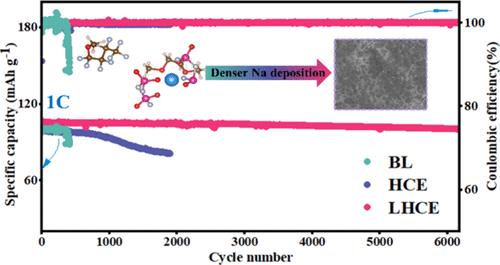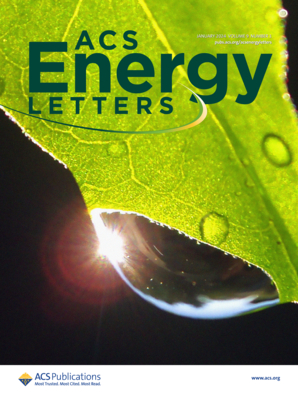Regulating Solvation Shell to Fortify Anion–Cation Coordination for Enhanced Sodium Metal Battery Stability
IF 19.3
1区 材料科学
Q1 CHEMISTRY, PHYSICAL
引用次数: 0
Abstract
The use of sodium metal as an anode presents a promising avenue for high energy density sodium rechargeable batteries given its high specific capacity and low redox potential. However, sodium metal batteries (SMBs) encounter significant challenges, including interfacial parasitic reactions and dendrite growth. Developing a robust solid electrolyte interphase (SEI) is crucial for SMB engineering. This study introduces hydrofluoroether as a diluent in high-concentration electrolytes, effectively modifying the solvation structure to enhance ion-pair coordination, which leads to an inorganic-rich SEI, mitigating sodium depletion and dendrite formation. Consequently, localized high concentration electrolytes achieve a 98.3% Coulombic efficiency in Na||Cu batteries, while the Na||NaFe1/3Ni1/3Mn1/3O2 battery retains 86.4% capacity after 750 cycles at 1C. Additionally, the Na||Na3V2(PO4)3 battery achieves an exceptional average Coulombic efficiency of 99.97% at 1C, with a capacity retention of 95.4% after 517 days. This study provides a framework for enhancing efficiency and longevity in SMBs that can be applied to other battery systems.

调节溶壳强化阴阳离子配位以增强金属钠电池稳定性
鉴于金属钠的高比容量和低氧化还原电位,使用金属钠作为阳极为高能量密度钠充电电池提供了一条前景广阔的途径。然而,金属钠电池(SMB)面临着巨大的挑战,包括界面寄生反应和枝晶生长。开发一种坚固的固体电解质相(SEI)对 SMB 工程至关重要。本研究在高浓度电解质中引入氢氟醚作为稀释剂,有效地改变了溶解结构,增强了离子对配位,从而形成了富含无机物的 SEI,缓解了钠耗竭和枝晶的形成。因此,局部高浓度电解质在 Na||Cu 电池中实现了 98.3% 的库仑效率,而 Na||NaFe1/3Ni1/3Mn1/3O2 电池在 1C 下循环 750 次后仍能保持 86.4% 的容量。此外,Na||Na3V2(PO4)3 电池在 1C 下的平均库仑效率高达 99.97%,517 天后的容量保持率为 95.4%。这项研究为提高 SMB 的效率和寿命提供了一个框架,可应用于其他电池系统。
本文章由计算机程序翻译,如有差异,请以英文原文为准。
求助全文
约1分钟内获得全文
求助全文
来源期刊

ACS Energy Letters
Energy-Renewable Energy, Sustainability and the Environment
CiteScore
31.20
自引率
5.00%
发文量
469
审稿时长
1 months
期刊介绍:
ACS Energy Letters is a monthly journal that publishes papers reporting new scientific advances in energy research. The journal focuses on topics that are of interest to scientists working in the fundamental and applied sciences. Rapid publication is a central criterion for acceptance, and the journal is known for its quick publication times, with an average of 4-6 weeks from submission to web publication in As Soon As Publishable format.
ACS Energy Letters is ranked as the number one journal in the Web of Science Electrochemistry category. It also ranks within the top 10 journals for Physical Chemistry, Energy & Fuels, and Nanoscience & Nanotechnology.
The journal offers several types of articles, including Letters, Energy Express, Perspectives, Reviews, Editorials, Viewpoints and Energy Focus. Additionally, authors have the option to submit videos that summarize or support the information presented in a Perspective or Review article, which can be highlighted on the journal's website. ACS Energy Letters is abstracted and indexed in Chemical Abstracts Service/SciFinder, EBSCO-summon, PubMed, Web of Science, Scopus and Portico.
 求助内容:
求助内容: 应助结果提醒方式:
应助结果提醒方式:


